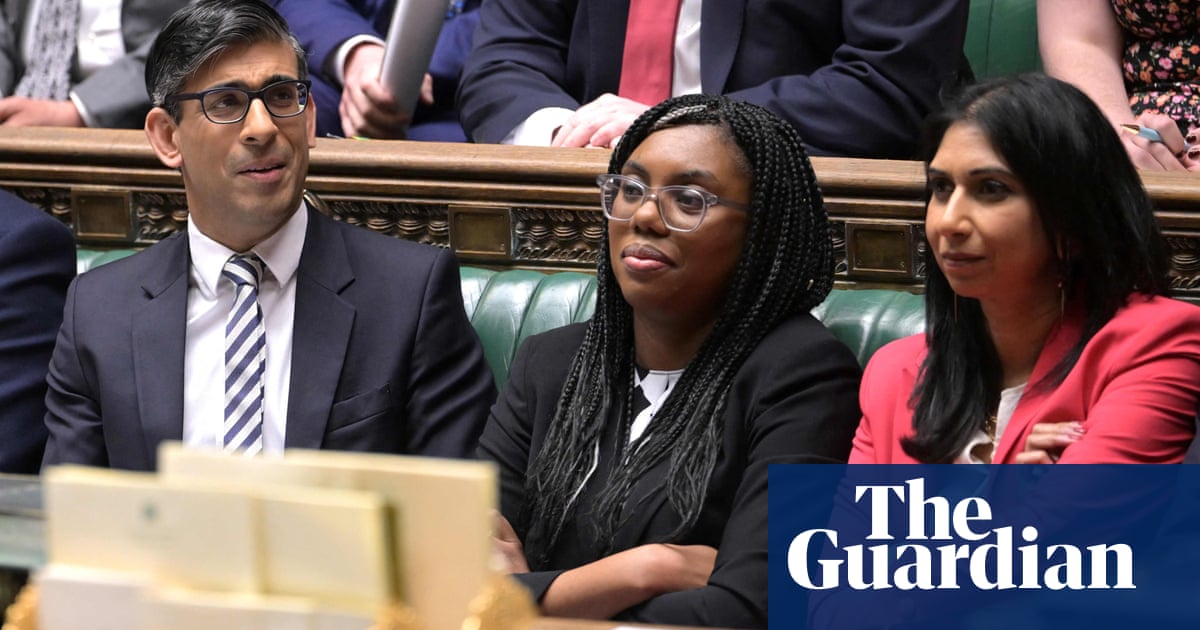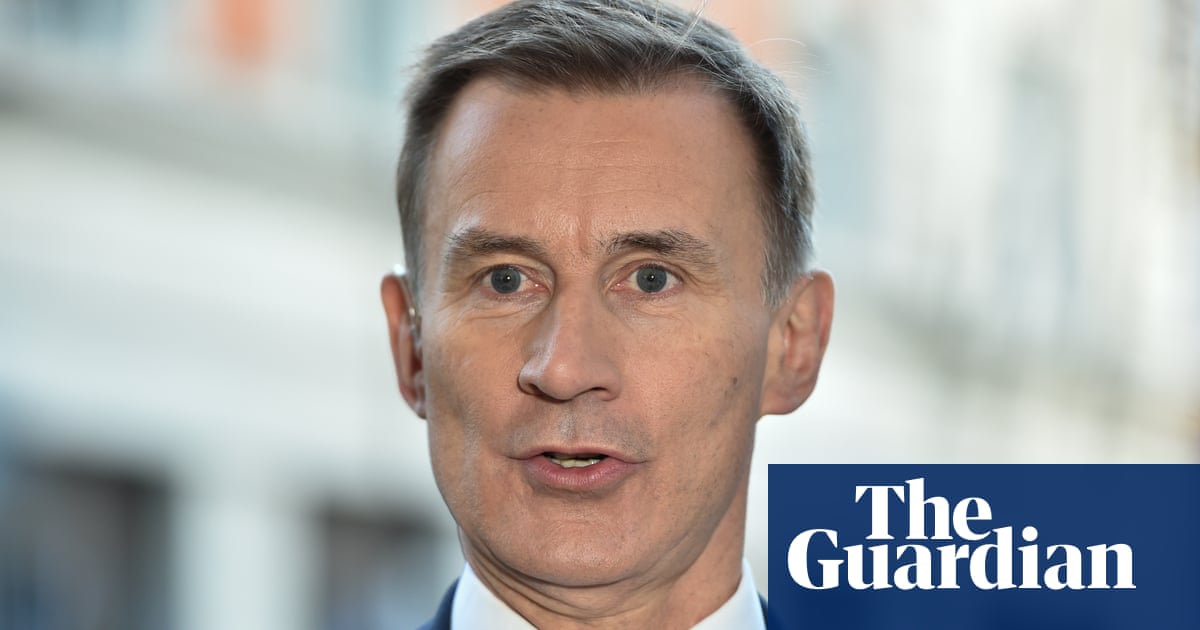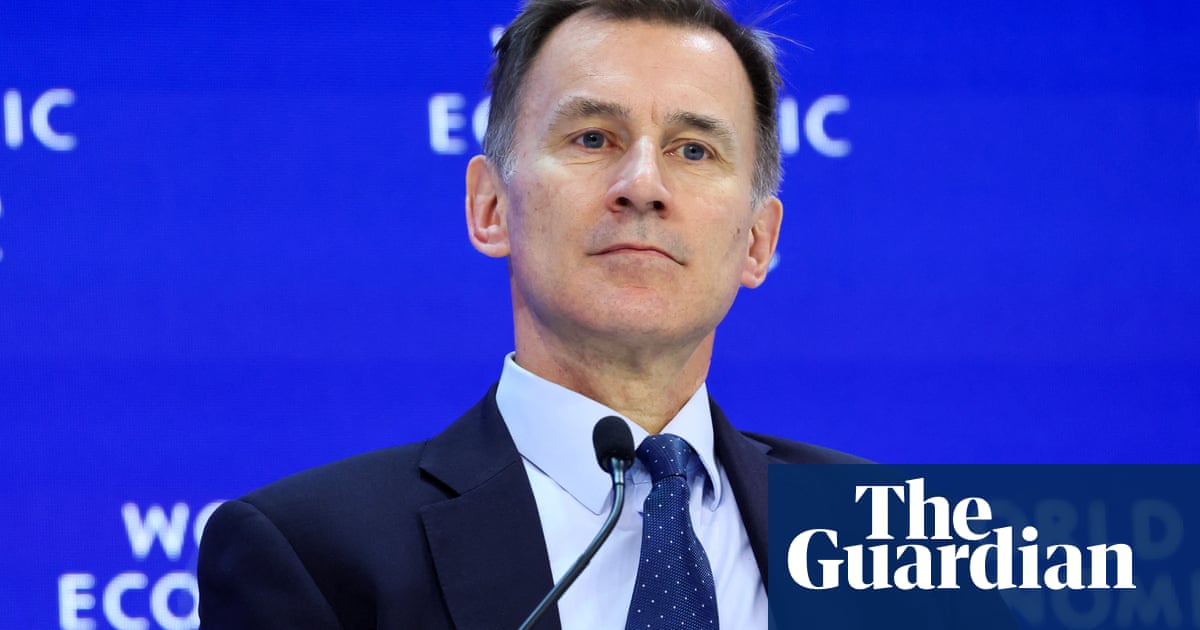
Jeremy Hunt has warned the Conservatives that elections are won from the centre ground, amid fears that the party could lurch to the right in response to Nigel Farage’s return to frontline politics.
In an interview with the Guardian, the chancellor suggested the party must remain a “broad church” despite concerns that Reform UK could cost the Tories as many as 60 seats at the general election.
Hunt admitted that it would be “very difficult” for the Conservatives to win on their current trajectory, but suggested it would not have made any difference if Rishi Sunak had waited until the autumn to name the date.
He said that while there was just a “narrow path” to victory and the election was likely to be “heavy pounding” for the party, Theresa May had been 17 points ahead at the same point in 2017 and “lots can change” during the campaign.
A poll from YouGov, its first since Farage announced he would stand to become an MP, showed Reform surging to within just two points of the Conservatives. Labour was on 40%, the Tories on 19%, Reform 17% and the Lib Dems 10%.
Asked whether the Tories should pitch to the right in response to the threat from Reform, Hunt replied: “The evidence of Britain is that elections are always won from the centre ground and I think in a two-party system that will always be the case.
“We’ll always be a broad church, and I think that’s a good thing.”
Hunt said the Tories should remind voters of the “massive disconnect” between Farage’s ambition to “smash” the Tory party, thereby aiding Labour’s path to power, and what Reform voters wanted, which was “not a Labour government in a million years”.
Farage has said this will be the “immigration election” as he seeks to capitalise on concerns around small boat crossings of the Channel and the numbers of legal migrants. The Tories pledged this week to cap visa numbers.
Hunt said Reform’s net-zero migration policy would bear an economic cost and the UK needed a “sensible” policy to reduce legal immigration, which “won’t happen overnight”.
He said Farage was wrong to suggest there was a simple solution to cutting illegal immigration, and he said Reform should be honest with the electorate about that, while he criticised Labour for pledging to scrap the Rwanda deportation plan.
Farage’s return has also increased the pressure from Tory rightwingers for Sunak to make a commitment in his manifesto, which is expected next week, to withdraw the UK from the European convention on human rights (ECHR), although such a move could trigger a mutiny from Tory centrists.
In the ITV leaders’ debate on Tuesday, the prime minister said it was “crystal clear” that he would prioritise securing the UK’s borders, indicating a tougher stance on the ECHR. Hunt hinted that the party could promise to try to “reform” the ECHR instead, rather than withdraw entirely.
“We need to be able to have control of our borders. That has to be decided by elected politicians, accountable to voters through parliament, not by foreign courts,” he said. “You’ll need to wait on [the manifesto] but I think what we would all like to see is reform of the ECHR.”
Hunt insisted that the economy had turned a corner, with inflation falling to 2.3% in the year to April 2024. He conceded that interest rates had not yet fallen, but said: “They might soon.”
He added: “Are people feeling it? I think people are feeling quite bruised. They’ve had a very tough time with big challenges with the cost of living. But I think people do feel more optimistic and are less worried about their immediate economic prospects.”
The chancellor said the Tories were not getting credit nationally for economic improvements, suggesting there were similarities with the US, where Joe Biden had not reaped the rewards of a more optimistic economic outlook.
“Are we getting credit? Nationally, you could look at the polls and say the answer is no,” he said, adding that in his own constituency, voters had trusted the Tories to “get the economy back on its feet when things have gone wrong”.
The Tories are expected to focus on their core vote in their manifesto, with potentially eye-catching policies on tax. Hunt declined to confirm reports that they would pledge to cut inheritance tax.
He defended decisions taken in his time at the Treasury, saying tax rises – which have resulted in a historically high tax burden – “had to happen to right the ship”. He also defended his decision to cut national insurance, despite it angering some pensioners, who did not benefit.
“The NI cuts fill one in five vacancies in the economy, because they create an extra 200,000 jobs, so it’s a big deal for growing the economy,” he said. “That’s the only way you can afford things like the triple lock. It’s not the easiest argument to make, but it’s true.”
Hunt admitted that the fiscal backdrop would be “challenging” for whoever won the election and acknowledged that there would have to be spending cuts, although he claimed that under the Tories these “efficiencies” would not affect the services received by the public.
He dismissed as “facile” a suggestion that the Tories might have done more to modernise public services and improve productivity in their last 14 years in power, saying standards had improved over that period.












